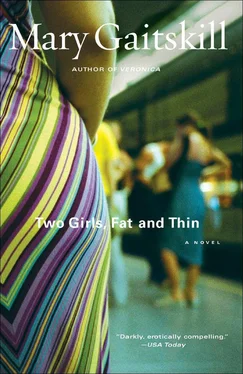Mary Gaitskill - Two Girls, Fat and Thin
Здесь есть возможность читать онлайн «Mary Gaitskill - Two Girls, Fat and Thin» весь текст электронной книги совершенно бесплатно (целиком полную версию без сокращений). В некоторых случаях можно слушать аудио, скачать через торрент в формате fb2 и присутствует краткое содержание. Год выпуска: 2012, Издательство: Simon & Schuster, Жанр: Современная проза, на английском языке. Описание произведения, (предисловие) а так же отзывы посетителей доступны на портале библиотеки ЛибКат.
- Название:Two Girls, Fat and Thin
- Автор:
- Издательство:Simon & Schuster
- Жанр:
- Год:2012
- ISBN:нет данных
- Рейтинг книги:5 / 5. Голосов: 1
-
Избранное:Добавить в избранное
- Отзывы:
-
Ваша оценка:
- 100
- 1
- 2
- 3
- 4
- 5
Two Girls, Fat and Thin: краткое содержание, описание и аннотация
Предлагаем к чтению аннотацию, описание, краткое содержание или предисловие (зависит от того, что написал сам автор книги «Two Girls, Fat and Thin»). Если вы не нашли необходимую информацию о книге — напишите в комментариях, мы постараемся отыскать её.
Review) create a haunting and unforgettable journey into the dark side of contemporary life and the deepest recesses of the soul.
Two Girls, Fat and Thin — читать онлайн бесплатно полную книгу (весь текст) целиком
Ниже представлен текст книги, разбитый по страницам. Система сохранения места последней прочитанной страницы, позволяет с удобством читать онлайн бесплатно книгу «Two Girls, Fat and Thin», без необходимости каждый раз заново искать на чём Вы остановились. Поставьте закладку, и сможете в любой момент перейти на страницу, на которой закончили чтение.
Интервал:
Закладка:
I felt locked out of my own fat body, as if I were a disembodied set of impulses and electrical discharges, disconnected rage and fear, something like what real humans feel in abandoned houses and call “ghosts.” I remembered my father on top of me, mashing my lungs, making my breath smaller and tighter until it barely existed, opening my body with his fingers, infecting me with his smells, his sounds, grinding his skin on mine until it came off as a powder and filtered into my pores, spewing his deepest poison onto my skin where it was subtly absorbed into my blood and cells and came out in my sweat, my urine and shit, even my voice and words. I felt so saturated by his liquid stench, I didn’t even think to wash it off when he left. I let it dry on my stomach or chest or ass, as I lay still with tears in my eyes. I sat in my dorm room and thought of taking a knife and cutting my face. I went into the bathroom and turned on the light and took off my shirt to stare at and hate my body. There were pimples on my chest and I welcomed them, wishing they were boils or scars, anything to more fully degrade this body, loathed even by its own parent. I had the fleeting thought that my roommate could come home at any minute, and I hoped she would so that I could display the truth of how loathsome I was and feel her contempt as well as my own. But she didn’t come. I sat on the floor and banged my head on the wall and cried like every homely girl who can’t be cute, can’t have a “good personality,” can’t be like the stuck up pretty bitches who throw their beauty away in bored flirtation and don’t have to be nice to anybody. Why, why, why can’t I be like everybody else?
The sound of my ragged sobs alarmed me, and I realized that my head was getting badly hurt, that I had better stop this now. I had to distract myself. Like someone running to put out a fire, I jumped up and shut the windows, closing out the hurtful sounds of other people. I put on my shirt and paced the room, hugging my poor body as if to apologize for the mean things I’d subjected it to. It was fat and nobody liked it, but it was mine, and suddenly I wanted to defend it and hide it away somewhere safe. I went to my bookshelves, my pulse returning slowly to a normal condition. I remembered how reading The Bulwark had made me feel in high school. I picked up The Gods Disdained and went to my bed, collecting my potato chips on the way, and sat wound in a blanket with the book.
The first thing I read was how utterly alone Solitaire D’Anconti was in the world and how much pain it had caused her. I could understand that. It described how she’d lived in isolation in the bosom of her family, how she was incomprehensible to her parents and resented by her siblings. I read on. It described her pain as a thing of beauty and grandeur, her isolation as a sign of her innate superiority, and, in fact, caused by her superiority, comparable to mountain peaks and skyscrapers. “Every loneliness is a pinnacle,” wrote Anna Granite. I had never thought of it this way before. I read of Solitaire’s physical beauty and intellectual brilliance, how she “grimly seized the rapier of hatred thrust upon her by the squalling mob and fought her way out, forcing the hot anger of her pain into the icy steel of her intellect.” So, not every social misfit was ugly and/or fat! They didn’t all lie on the bathroom floor banging their heads! Some of them ran corporations, which is what Solitaire grew up to do.
The book was about the struggle of a few isolated, superior people to ward off the attacks of the mean-minded majority as they created all the beautiful important things in the world while having incredible sex with each other. It ended with almost all the inferior majority being blown up in chemical disasters, perishing in airplane wrecks or collapsing buildings, all more or less simultaneously, all as an indirect result of their own inferiority.
My roommate returned that morning to find me pacing our shared unit, playing classical music on the radio, and devouring donuts in a state of exaltation.
The days during which I read The Gods Disdained were different from the days before. My life was no longer organized around the meaningless nightmare of dinner in the dorm cafeteria, the walk from class to class, or the classes themselves with their inadequate intellectual content on which I’d vainly tried to ground my flying psyche. Instead, it was the struggles and triumphs of Solitaire, Skip, Bus Taggart, and an array of other characters who now served as the support and metaphor of my existence. Sure, I knew they weren’t real people, but they had sprung from the mind of a real person and thus, according to an argument I’d heard in a philosophy class, were possible. These people were possible!
I finished reading at about four in the morning in a state of such poignant excitation that I went out and walked around Blythetown for hours, sweating, smiling, almost in tears, loving even the sight of brutish boys weaving heavily out of late-closing bars and vomiting in the street. The world, previously an incomprehensible prison, was now an orderly place where I could live with dignity. Even what my father had done to me — as a result of his denial of reality — was not too horrible to look at, could be explained and then rejected. I could determine my own world and reject anything that made it an unhappy place.
I skipped school the next day, went to a bookstore and bought everything written by Granite. I stayed home and read for days, oblivious to the histrionic comings and goings of my roommate. When I finished the last of the books, I started over again with The Gods Disdained . Between readings I went to classes and walked around the tiny campus, delirious with ideas.
In this state of intellectual euphoria, I found it almost impossible to pay attention to my school work. My new world view, structured through Granite’s philosophy, could easily be disarranged by the evil little weavings of the inferior thinkers who dominated my studies, or the noxious barrage of other people’s ideas I received when I sat in the cafeteria, or even the complicated probings of my well-meaning counselor. This did not make me think, as it might have, that perhaps my Granite-based structure was unduly frail. I thought the ease with which my new world was imperiled was due to its newness and my own inexperience in fending off challenges to it. I tried to bring it into contact with other people. I introduced Granite into discussions in history and philosophy and was dismissed by my philosophy professor (“I don’t deal with the work of dime-store ideologues”) and blankly stared at by my history teacher, who’d never heard of her. I was able to talk a little with my roommate, Lisa, as she dragged herself around in the morning in her red kimono and socks, chain-smoking and drinking coffee; she actually seemed grateful when I analyzed her miserable romantic experiences in Granite’s terms.
But gradually I had to cut out anything that threatened my new world. First to go was my counselor, with her puzzled assurances that any time I needed her, she was there. Then I stopped answering the letters from my mother, those crookedly scrawled missives whose words careened up and down and across the pages, oblivious to lines. Such urgent, frantic script about such a poor dull life. Finally I stopped opening them. Several weeks of silence brought the lounge phone to life and snotty co-eds into my territory with news that I “gotta call,” always from my mother, featuring the occasional tense deranged tenor of my father. It made me almost physically sick to squat on the lounge floor with the phone wedged between shoulder and jaw, corporeally in the sphere of giggling students and canned rock music, and psychically in the realm of my childhood with its listing floors and treacherous light. My mother wanted to know if I was all right. My father wanted to know about my grades. They told me they had new neighbors, and a new paperboy who “missed the goddamn porch every time.” I returned to my room in a state of paralysis.
Читать дальшеИнтервал:
Закладка:
Похожие книги на «Two Girls, Fat and Thin»
Представляем Вашему вниманию похожие книги на «Two Girls, Fat and Thin» списком для выбора. Мы отобрали схожую по названию и смыслу литературу в надежде предоставить читателям больше вариантов отыскать новые, интересные, ещё непрочитанные произведения.
Обсуждение, отзывы о книге «Two Girls, Fat and Thin» и просто собственные мнения читателей. Оставьте ваши комментарии, напишите, что Вы думаете о произведении, его смысле или главных героях. Укажите что конкретно понравилось, а что нет, и почему Вы так считаете.












